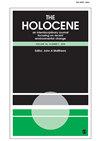近8000年来从干旱的中亚小龙池湖记录的ENSO相关百年和千年尺度的水文气候变化
IF 1.8
3区 地球科学
Q3 GEOGRAPHY, PHYSICAL
引用次数: 0
摘要
中亚干旱地区不同时间尺度的气候变化及其机制具有重要意义。然而,El Niño−南方涛动(ENSO)在百年和千年时间尺度上对中国大陆全新世水文气候的贡献受到良好年龄控制和高时间分辨率记录的限制。本文利用天山中部小龙池沉积物岩心的高分辨率x射线荧光(XRF)扫描数据,重建了该区近8000年来的水文气候变化。我们的研究表明,在8000 - 5500 cal年BP期间,气候是干燥的,在5500 - 0 cal年BP期间是湿润的,这与千年时间尺度上的ENSO模式相似。在百年尺度上,8个湿期、7个干期和1个移位期的水文气候波动具有显著的800年周期性,与ENSO周期变化一致。800年带通过滤水文气候与ENSO的正相关关系表明,湿润(干燥)气候条件对应ENSO活动的增加(减少)。我们提出在全新世千年至百年尺度上,El Niño-like (La Niña-like)条件下可能存在“华南(干)、华北(干)”的空间格局。本文章由计算机程序翻译,如有差异,请以英文原文为准。
ENSO-related centennial and millennial-scale hydroclimate changes recorded from Lake Xiaolongchi in arid Central Asia over the past 8000 years
Climate changes on different timescales and their mechanisms are of great importance in arid Central Asia (ACA). However, the contribution of El Niño−Southern Oscillation (ENSO) to Holocene hydroclimate in ACA on centennial and millennial timescales is limited by records with good age control and high temporal resolution. Here, we present high-resolution X-ray fluorescence (XRF) scanning data of a sediment core from Lake Xiaolongchi in central Tianshan Mountains to reconstruct hydroclimate changes in ACA over the last 8000 years. Our construction exhibits that the climate was dry from 8000 to 5500 cal year BP and wet from 5500 to 0 cal year BP, which resembles ENSO patterns on a millennial timescale. On the centennial timescale, hydroclimate fluctuations with eight wet periods, seven dry periods, and a shift period have a significant 800-year periodicity, coincident with periodic ENSO variance. The positive relationship between 800-year band-pass filtered hydroclimate and ENSO indicates that wet (dry) climate conditions correspond to increased (reduced) ENSO activity. We propose that the spatial pattern of “wet (dry) southern China and ACA, and dry (wet) northern China” during the El Niño-like (La Niña-like) condition may exist during the Holocene on millennial to centennial timescales.
求助全文
通过发布文献求助,成功后即可免费获取论文全文。
去求助
来源期刊

Holocene
地学-地球科学综合
CiteScore
4.70
自引率
8.30%
发文量
106
审稿时长
4 months
期刊介绍:
The Holocene is a high impact, peer-reviewed journal dedicated to fundamental scientific research at the interface between the long Quaternary record and the natural and human-induced environmental processes operating at the Earth''s surface today. The Holocene emphasizes environmental change over the last ca 11 700 years.
 求助内容:
求助内容: 应助结果提醒方式:
应助结果提醒方式:


